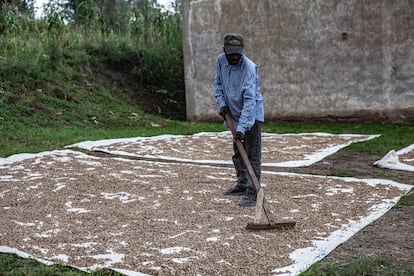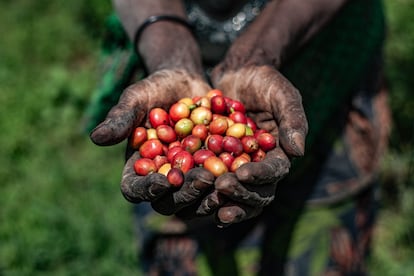Congolese coffee farmers are fleeing their lands due to armed conflict, leaving their prized beans at the mercy of looters.

When he was 13, Marko Kalirhe, a 46-year-old coffee farmer living in North Kivu (Democratic Republic of the Congo, DRC), lost his parents and had to take care of his family of seven. Growing coffee, a trade he had learned from his parents, was his way of overcoming hardship and allowed him, for decades, to send his siblings and then his own children to school. But now, after fleeing his farm due to the fighting in eastern DRC , which intensified earlier this year, Kalirhe sees the livelihood he had built slowly fading away.
“I lived as a refugee in Mabula for over three months,” Kalirhe told this newspaper. “The harvest had already started in January and normally ends in March. For over two months, the coffee beans remained scattered across the fields,” adds the father of 12 children.
Karlihe says that after most of the residents were forced to leave due to the violence, the few young men who remained in the village took to looting and harvesting coffee from abandoned farms. When he returned, he found that much of the harvest had been spoiled. His neighbor's land, which was very productive, was overgrown with weeds. And his own coffee trees, untended during the peak season, were beginning to wither.

Since violence erupted again in the DRC in January 2025 between the Rwandan-backed March 23 Movement (M23) rebels and the Congolese army, hundreds of thousands of people have been forced to flee. There are 5.9 million internally displaced people in the country, primarily in the provinces of Ituri, North Kivu, and South Kivu, according to the latest figures from the United Nations High Commissioner for Refugees (UNHCR).
Among those affected are thousands of coffee farmers who have been forced to leave their homes and crops . The impact of the armed conflict further complicates the plight of a crop that was once considered one of the best in the world. Farmers like Kalirhe say it is "very difficult" to resume coffee production today because their lives are at stake.
Although the DRC government and the M23 rebels pledged in mid-June to open peace negotiations and a ceasefire, the violence continues unabated. In recent weeks, the Congolese army has reported massacres committed by the M23 in South Kivu and North Kivu provinces. The latter left 320 dead.
The poor conditions of the agricultural sector, the lack of financial aid from the government and, recently, the fighting, are serious obstacles for the sector.
Marie Bambaga, coffee farmer
The coffee sector, which has been key to the DRC's rural economy and whose exports have enjoyed global prestige, is collapsing under the weight of armed violence, displacement, and decades of political instability.
Coffee was introduced by Belgian settlers in the 1940s. The crops thrived in the fertile soils of Équateur, which was then a single province in the northwest and is now divided into several. In the 1980s, the DRC exported between 68,000 and 130,000 tons of coffee annually, according to FAO data.
Marie Bambaga, a farmer representing a group of women farmers and ranchers in Kivu, finds it disconcerting that the DRC exported more than 10,423 tons of coffee in 2022 and 7,380 tons in 2023, according to data from the Food and Agriculture Organization of the United Nations (FAO), the equivalent of the production of "a small Brazilian producer." "Our Arabica coffee has the best flavor in the world," she says. "However, the poor conditions of the agricultural sector, the lack of financial aid from the government, and, more recently, the fighting, are serious obstacles for the sector," she laments.
According to experts interviewed by EL PAÍS, the industry barely survives on old trees, scattered cooperatives, and farmers who risk their lives just to reach their land, while international investors remain distant and government support remains virtually nonexistent.

Kalirhe's problems are not an isolated case. Prudent Ngongo Safari, one of the main coffee producers in the Kalehe territory in South Kivu and a member of a cooperative that once included more than 4,600 farmers, says the lack of security in the province has crippled his livelihood.
Safari says that, at his peak, he produced more than 5,000 tons of coffee a year. Now, he can't even reach his land and fears that the situation in the province could worsen at any moment. "Today, banks in rebel-held areas are closed, so I have no way to get credit for my projects or the working capital needed to maintain my plantation or pre-finance future harvests," he adds.
UntenableMany farmers interviewed for this report emphasize that coffee cultivation has become almost unsustainable. Other staple crops, such as cassava, legumes, and corn, are not as profitable, and their potential has also vanished because the fields are no longer sustainable.
Agricultural expert Cyprien Muhoza explains that coffee is “too demanding a crop” to be cultivated in the hope of obtaining a harvest.
The end of the war is nowhere in sight, and the sponsors who provided financial aid have stepped back. "No investor can even consider putting money into a situation with so much uncertainty," the expert says. Although some farmers have managed to form cooperatives and obtain microcredit to maintain their coffee crops, most are struggling, he adds.
The current war may be the final nail in the coffin for this once highly valued crop.
Congolese agronomist
Adélard Palata, a Congolese agronomist, recalls that the deteriorating political situation between the 1980s and 1990s “led to a drop in international coffee prices.” “[Then] plantation owners began to lose interest in the crop,” explains Palata, co-founder of the Kawa Kanzururu association, which brings together 2,400 small producers in the Rwenzori region of Beni, North Kivu.
“People started abandoning coffee in the 1980s,” he adds, “when Vietnam entered the world market.” Since then, production has declined by more than 75% . “Four decades of decline have put DRC coffee growers on the ropes,” Palata says. “The current war may be the final nail in the coffin for this once highly valued crop.”
EL PAÍS





